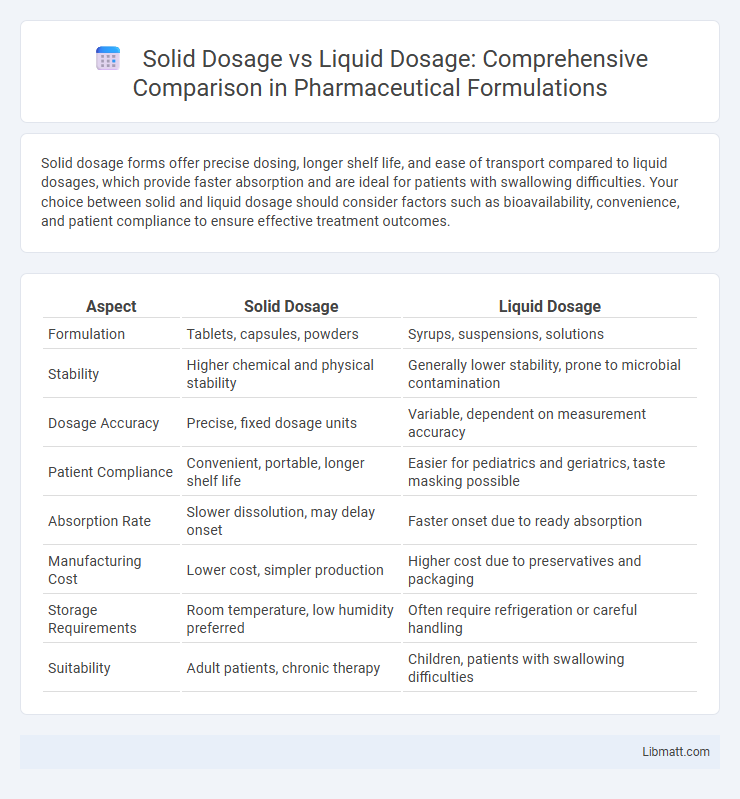Solid dosage forms offer precise dosing, longer shelf life, and ease of transport compared to liquid dosages, which provide faster absorption and are ideal for patients with swallowing difficulties. Your choice between solid and liquid dosage should consider factors such as bioavailability, convenience, and patient compliance to ensure effective treatment outcomes.
Table of Comparison
| Aspect | Solid Dosage | Liquid Dosage |
|---|---|---|
| Formulation | Tablets, capsules, powders | Syrups, suspensions, solutions |
| Stability | Higher chemical and physical stability | Generally lower stability, prone to microbial contamination |
| Dosage Accuracy | Precise, fixed dosage units | Variable, dependent on measurement accuracy |
| Patient Compliance | Convenient, portable, longer shelf life | Easier for pediatrics and geriatrics, taste masking possible |
| Absorption Rate | Slower dissolution, may delay onset | Faster onset due to ready absorption |
| Manufacturing Cost | Lower cost, simpler production | Higher cost due to preservatives and packaging |
| Storage Requirements | Room temperature, low humidity preferred | Often require refrigeration or careful handling |
| Suitability | Adult patients, chronic therapy | Children, patients with swallowing difficulties |
Introduction to Pharmaceutical Dosage Forms
Pharmaceutical dosage forms significantly influence drug absorption, stability, and patient compliance, with solid dosage forms such as tablets and capsules offering precise dosing and extended shelf life. Liquid dosage forms, including solutions and suspensions, provide quicker onset of action and easier administration for patients with swallowing difficulties. Understanding the properties of these dosage forms helps you choose the most effective medication delivery method for specific therapeutic needs.
Overview of Solid Dosage Forms
Solid dosage forms, including tablets, capsules, and powders, offer precise dosing, extended shelf life, and ease of transport compared to liquid alternatives. These forms ensure stability and controlled release of active pharmaceutical ingredients, making them suitable for a wide range of medications. Understanding the benefits of solid dosage can help you choose the most effective and convenient medication format for your needs.
Overview of Liquid Dosage Forms
Liquid dosage forms include solutions, suspensions, emulsions, syrups, and elixirs, offering rapid absorption and ease of swallowing compared to solid dosages. These forms allow precise dose adjustments and are ideal for patients with difficulty swallowing pills, such as children and the elderly. Your choice of liquid dosage can enhance bioavailability and therapeutic effectiveness in various treatment regimens.
Advantages of Solid Dosage Forms
Solid dosage forms offer enhanced stability and longer shelf life compared to liquid formulations, reducing the risk of degradation and contamination. They provide precise dosing, ease of transport, and are often more convenient for patients, promoting adherence to medication regimens. Cost-effective manufacturing and packaging further contribute to the widespread preference for tablets and capsules in pharmaceutical delivery.
Advantages of Liquid Dosage Forms
Liquid dosage forms offer rapid absorption and faster onset of action compared to solid dosage forms, making them ideal for patients requiring immediate relief. They provide flexible dosing options, especially beneficial for pediatric and geriatric populations who may have difficulty swallowing tablets or capsules. Enhanced bioavailability and ease of administration contribute to improved patient compliance and therapeutic outcomes.
Limitations of Solid Dosage Forms
Solid dosage forms face limitations such as delayed drug absorption due to slower dissolution rates compared to liquids, which can reduce bioavailability for certain medications. They may also pose challenges for patients with difficulty swallowing, limiting their accessibility and adherence. You might need an alternative like liquid dosage forms for faster onset or ease of administration in specific medical conditions.
Limitations of Liquid Dosage Forms
Liquid dosage forms face limitations such as reduced stability and shorter shelf life due to susceptibility to microbial growth and chemical degradation. Precise dosing can be challenging because liquids require careful measurement, increasing the risk of dosing errors. Moreover, liquid formulations often have poor portability and require preservatives, which may cause adverse reactions in sensitive patients.
Key Factors Influencing Dosage Form Selection
Key factors influencing dosage form selection include drug stability, bioavailability, and patient compliance. Solid dosage forms often offer greater stability and precise dosing, while liquid dosage forms provide easier administration and faster absorption. Your choice depends on the specific therapeutic needs, manufacturing considerations, and the target patient population's preferences.
Patient Compliance: Solid vs Liquid Dosage
Solid dosage forms, such as tablets and capsules, generally offer improved patient compliance due to their ease of administration, portability, and precise dosing. Liquid dosage forms provide flexibility for dose adjustments and are preferred for pediatric and geriatric patients with swallowing difficulties. Patient compliance ultimately depends on individual preferences, medical conditions, and the specific therapeutic requirements of the medication.
Future Trends in Dosage Form Development
Future trends in dosage form development emphasize personalized medicine with advanced solid dosage forms featuring controlled-release technologies and 3D printing for patient-specific doses. Liquid dosages are evolving with nanotechnology-enhanced bioavailability and stability improvements, enabling more precise therapeutic effects. Your treatment options will increasingly benefit from these innovations, offering enhanced efficacy and tailored drug delivery systems.
Solid Dosage vs Liquid Dosage Infographic

 libmatt.com
libmatt.com